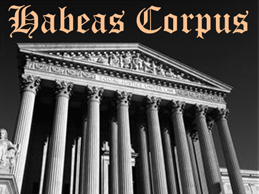The Intricacies of Filing a Habeas Corpus Petition: A Guide for Looking For Post-Conviction Relief
Browsing the intricacies of filing a habeas corpus application is a vital step for people seeking post-conviction relief. By checking out the ins and outs of this crucial legal device, individuals can reveal potential opportunities for difficult convictions and ultimately aim for reasonable end results.
Understanding Habeas Corpus Requests
When looking for to understand habeas corpus applications, it is vital to comprehend the fundamental legal principles underlying this powerful legal treatment (Attorney). Habeas corpus, a Latin term meaning "you shall have the body," is a legal activity that permits individuals to look for alleviation from illegal detention or imprisonment. This centuries-old writ acts as a protect versus approximate state activity by giving a system for people to test the legality of their confinement
The keystone of a habeas corpus request is the assertion that the petitioner's constitutional legal rights have been breached, resulting in their illegal apprehension. This can consist of insurance claims of due process offenses, ineffective aid of guidance, newly found evidence, and even administrative mistakes. Habeas corpus requests usually occur in the context of criminal proceedings, where individuals challenge the legitimacy of their convictions or the conditions of their arrest.

Grounds for Filing
There are several lawful grounds on which people may file a habeas corpus petition, each functioning as a basis for challenging the lawfulness of their detention. These premises usually include constitutional infractions, inadequate support of guidance, newly uncovered proof, prosecutorial misconduct, and jurisdictional issues.
Constitutional violations develop an usual basis for filing a habeas corpus petition, encompassing cases such as infractions of the right to a fair test, due procedure, or defense versus terrible and uncommon penalty. Inefficient help of counsel insurance claims develop when an accused's legal representation during the test or allure was so lacking that it undermines self-confidence in the outcome. Freshly uncovered proof, if verified to be material and likely to transform the outcome of the case, can additionally require habeas alleviation. Prosecutorial Our site transgression entails dishonest or unlawful conduct by the prosecution that prejudices the accused's civil liberties. Jurisdictional defects may occur when the court that convicted the specific did not have the authority to do so, supplying a basis for testing the detention with a habeas corpus petition.
Procedural Needs
Recognizing the procedural requirements for submitting a habeas corpus request is vital for making sure that the lawful procedure is complied with accurately and successfully. Failure to wear down state treatments can result in the government court dismissing the request.
In addition, there are strict time frame for filing a habeas corpus application. The Antiterrorism and Effective Capital Punishment Act (AEDPA) imposes an one-year law of restrictions, beginning from the day on which the sentence came to be final. However, this due date can be based on particular exemptions based on certain scenarios.
Additionally, procedural requirements mandate that a habeas corpus application need to include all pertinent cases and supporting proof. Incomplete or inadequate applications might be rejected or delayed, highlighting the value of detailed prep work and adherence to procedural policies in seeking post-conviction alleviation with habeas corpus.
Testing Sentences
How can people effectively test convictions via the procedure of submitting a habeas corpus petition? Testing convictions with a habeas corpus request entails providing lawful disagreements that show a violation of constitutional legal rights, step-by-step mistakes, or new proof that was not readily available during the original trial.
When submitting a habeas corpus request to challenge a conviction, it is essential to comply with rigorous procedural demands, present compelling lawful arguments supported by proof, and express just how the claimed errors influenced the fairness of the test. utah federal habeas corpus attorneys. Looking for the help of knowledgeable lawyers or organizations specializing in post-conviction relief can significantly enhance the chances of an effective end result when testing convictions through a habeas corpus request

Protecting Fair Outcomes
To attain reasonable results in tough sentences with the filing of a habeas corpus application, people should diligently analyze the lawful basis for their claims and present compelling evidence supporting their assertions. Protecting fair end results in post-conviction relief procedures needs an extensive understanding of the legal system, attention to detail, and calculated planning. It is necessary to have a clear method in position, laying out the certain grounds for the application and exactly how the provided evidence lines up with legal arguments.
Additionally, people looking for post-conviction relief must stick to all step-by-step demands and target dates to guarantee their application is considered by the court. Failure to meet these requirements could result in the dismissal of the application without the values being examined. Additionally, involving the solutions of experienced legal experts, such as attorneys specializing in habeas corpus applications, can substantially enhance the chances of safeguarding fair end results.
Conclusion
To conclude, the details of filing a habeas corpus petition for seeking post-conviction alleviation involve understanding the premises for filing, meeting step-by-step needs, challenging convictions, and securing fair results (habeas corpus petition). It is very important to carefully browse the legal process to make certain the very best chance of success in looking for alleviation via this opportunity. Comprehending the complexities of habeas corpus petitions is vital for individuals seeking to challenge their convictions and obtain justice
Comments on “Lawful Expertise on Habeas Corpus: Attorney Services and Support”